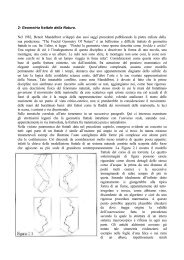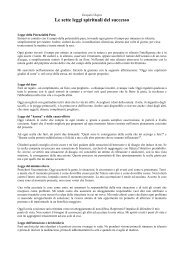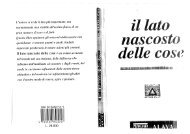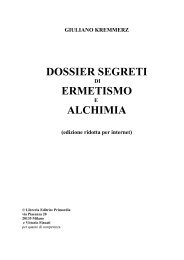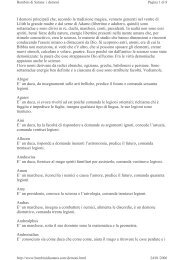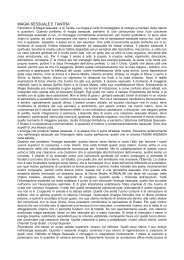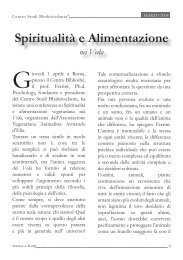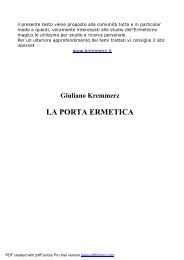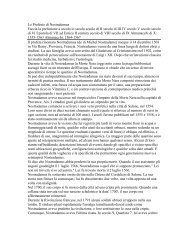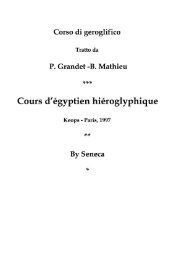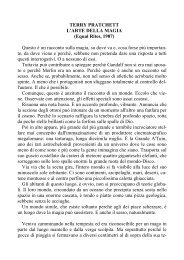Yale University Press NEW HAVEN & 9 780300"089028 - Sito Mistero
Yale University Press NEW HAVEN & 9 780300"089028 - Sito Mistero
Yale University Press NEW HAVEN & 9 780300"089028 - Sito Mistero
- No tags were found...
Create successful ePaper yourself
Turn your PDF publications into a flip-book with our unique Google optimized e-Paper software.
102 TALIBANadministrations made the Taliban appear as an occupying force, ratherthan administrators trying to win hearts and minds.The Taliban have to date given no indication as to how and whenthey would set up a more permanent representative government, whetherthey would have a constitution or not and how political power would bedivided. Every Taliban leader has different views on the subject. 'TheTaliban are willing to negotiate with the opposition, but on the one conditionthat no political parties take part in the discussions. Most of theTaliban have come from political parties and we know the conflict they;create. Islam is against all political parties,' a minister told me. 'Eventually;when we have peace people can select their own government, but firstthe opposition has to be disarmed,' said another minister. Others wantedan exclusive Taliban government. 4After 1996, power was entirely concentrated in the hands of MullahOmar while the Kandahar Shura was consulted less and less. MullahOmar's confidant Wakil made this apparent. 'Decisions are based on theadvice of the Amir-ul Momineen. For us consultation is not necessary.We believe that this is in line with the Sharia. We abide by the Amir'sview even if he alone takes this view. There will not be a head of state.Instead there will be an Amir-ul Momineen. Mullah Omar will be thehighest authority and the government will not be able to implement anydecision to which he does not agree. General elections are incompatiblewith Sharia and therefore we reject them.' 5To implement his decisions Mullah Omar relied less on the Kabul governmentand increasingly upon the Kandahari ulema and the religiouspolice in Kabul. Maulvi Said Mohammed Pasanai, the Chief Justice of:Kandahar's Islamic Supreme Court, who had taught Omar the basics ofjSharia law during the jihad, became a key adviser to Omar. He claimedresponsibility for ending lawlessness in the country through Islamic punishments.'We have judges presiding over 13 High Courts in 13 provincesand everywhere there is peace and security for the people,' he told me in j1997 6 Pasana^ wno \$ m h[ s 80s, said that he had handed out Islamicpunishments for nearly half a century in local villages and guided theMujaheddin in applying Sharia during the jihad.The Kandahar Islamic Supreme Court became the most importantcourt in the country because of its proximity to Omar. The Courtappointed Islamic judges, Qazis, and Assistant Qazis in the provinces andonce or twice a year assembled them all in Kandahar to discuss cases andthe application of Sharia law. A parallel system exists in Kabul where theJustice Ministry and the Supreme Court of Afghanistan are based. TheKabul Supreme Court handles about 40 cases a week and comprises eightdepartments which deal with laws related to commerce, business, criminaland public law, but it clearly does not have the same powers as the Kanda-iTHE TALIBAN'S POLITICAL AND MILITARY ORGANISATION ~ 103har Supreme Court. According to Attorney General Maulvi JalilullahMaulvizada, 'All the laws are being Islamicized. Those laws repugnant toIslam are being removed. It will take several years for us to go through allthe old laws and change or remove them.'The worsening economic situation and political alienation in Talibancontrolledareas along with the massive military losses they suffered, ledto increasing internal divisions. In January 1997, the Taliban faced arevolt from within the Kandahar heartland over forced conscription. Atleast four Taliban recruiters were killed by villagers who refused to jointhe army. The Taliban were driven out from several villages around Kandaharafter gunfights in which there were casualties on both sides. 7 Villageelders said that their young men faced death if they joined the army. 'TheTaliban had promised peace, instead they have given us nothing but war,'said one village elder. 8 In June, the Taliban executed 18 army desertersin Kandahar jail. 9 There were similar movements against conscriptionin Wardak and Paktia provinces. Forced conscription has increased theTaliban's unpopularity and forced them to draw more upon recruits fromPakistani madrassas and Afghan refugees settled there.Meanwhile the simmering differences between the Shuras in Kandaharand Kabul escalated dramatically in April 1998 after the visit of the USenvoy Bill Richardson to Kabul. Mullah Rabbani, the head of the KabulShura, agreed to implement Richardson's point agenda, but the next daythe agreement was rejected by Mullah Omar from Kandahar. Rabbaniwent off on one of his periodic long leaves and there were rumours hewas under arrest. In October 1998, the Taliban arrested over 60 peoplein Jalalabad, the largest city in eastern Afghanistan, claiming there was acoup attempt by ex-military officers loyal to General Shahnawaz Tanai,the Pashtun general who in 1990 had deserted Najibullah's army andjoined the Mujaheddin. His Pashtun officers had supported the Talibansince 1994 and many served in the Taliban army. 10 In December theTaliban shot a student dead and wounded several others during a disturbanceat the medical faculty of Nangarhar <strong>University</strong> in Jalalabad. Strikesand anti-Taliban protests took place in the city.The growing discontent in Jalalabad appeared to be instigated by supportersof the more moderate Mullah Rabbani, who had built a politicalbase in the city. Jalalabad's powerful traders who ran the smuggling tradefrom Pakistan also wanted a more liberal attitude from the Taliban. Afterthe Jalalabad incidents Mullah Rabbani was once again recalled fromKabul to Kandahar and disappeared from view for several months. By1998, the Kabul Shura was keen to moderate Taliban policies so that UNagencies could return to Afghanistan and greater international aid flowto the cities. Taliban leaders in the Kabul and Jalalabad Shuras werefeeling the growing public discontent at rising prices, lack of food and the




